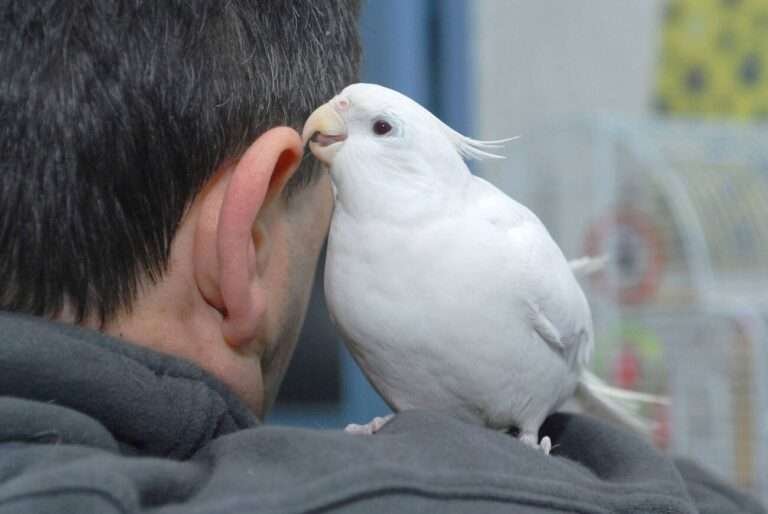Cockatiels intelligence compared to others Birds, Cats, Dogs and Pets

As someone who has worked with cockatiels for many years, I have developed a deep understanding of these remarkable birds. Cockatiels may not be as talkative as some of their parrot relatives like macaws, grey parrots, or Amazon parrots, but they are just as intelligent. Their ability to solve problems, recognize their owners, and adapt to their environment speaks to their high IQ.
In this post, I will explore cockatiel intelligence in comparison to other birds, as well as pets like dogs and cats. Let’s dive into what makes cockatiels such clever companions and how they stack up against other animals in terms of smarts.
The Intelligence of Cockatiels: A Comparative Analysis
Cockatiels are fascinating birds known for their social behaviors and vocal mimicry. Understanding their intelligence relative to other birds and common pets can provide valuable insights into their unique cognitive abilities. Here is a comprehensive examination of cockatiels’ intelligence in various contexts:
Compared to Other Birds
Parrots (e.g., African Grey Parrots, Macaws):
Intelligence Level: Parrots like African Grey Parrots and Macaws are considered some of the most intelligent birds.
Abilities: These larger parrots can solve complex puzzles, use tools, and have extensive vocabularies, sometimes understanding context and forming simple sentences. African Greys, for instance, can identify shapes, colors, and even understand numerical concepts.
Comparison: While cockatiels are adept at mimicry and learning tricks, they don’t reach the cognitive sophistication of African Greys or Macaws. Cockatiels can mimic sounds and perform tasks, but they generally do not exhibit the same level of problem-solving abilities and contextual understanding.
Crows and Ravens:
Intelligence Level: Crows and ravens are often deemed the “geniuses” of the bird world.
Abilities: Known for their problem-solving skills, these birds can use tools, recognize themselves in mirrors, plan for future events, and demonstrate a high level of social intelligence.
Comparison: Cockatiels, while intelligent, do not exhibit the same advanced cognitive behaviors as crows and ravens. They do, however, show impressive social interactions and mimicry for their size and species.
Pigeons and Doves:
Intelligence Level: Generally lower or comparable to cockatiels.
Abilities: Pigeons can recognize human faces, navigate long distances, and learn simple tasks.
Comparison: Cockatiels excel in social interactions and vocal mimicry compared to pigeons and doves, who are better navigators but less interactive.
Compared to Other Pets
Cats:
Intelligence Level: High, with strong observational learning and problem-solving skills.
Abilities: Cats can learn through observation, figure out how to open doors, understand some human gestures, and have excellent memory.
Comparison: Cats solve more complex physical problems and have a higher degree of independence, while cockatiels excel in social interaction, vocal mimicry, and learning tricks. Cockatiels are also more likely to seek social engagement with their human companions.
Dogs:
Intelligence Level: Very high, with advanced trainability and emotional understanding.
Abilities: Dogs can follow complex commands, perform tasks, recognize human emotions, and understand language to some extent. Breeds like Border Collies and Poodles are particularly noted for their intelligence.
Comparison: While dogs are highly trainable and emotionally perceptive, cockatiels display intelligence in their ability to mimic sounds and engage in playful, interactive behaviors. Cockatiels also form strong bonds with their owners, showing affection and requiring social interaction.
Small Mammals (e.g., Hamsters, Guinea Pigs, Rabbits):
Intelligence Level: Generally lower than cockatiels.
Abilities: These pets can learn simple tasks, navigate mazes, and recognize their owners.
Comparison: Cockatiels are more interactive, capable of learning a wider range of behaviors, including vocal mimicry and performing tricks. They also exhibit more complex social behaviors.
Cognitive Abilities of Cockatiels
Learning and Mimicry:
Cockatiels can learn to mimic household sounds, simple words, and short phrases. Their mimicry is often used to gain attention or communicate with their human companions.
They enjoy training sessions and can learn to perform various tricks, such as ringing a bell, playing dead, or even playing basketball with small hoops.
Problem-Solving:
While not as advanced as larger parrots or corvids, cockatiels can solve simple puzzles. They enjoy foraging toys that require them to figure out how to retrieve treats, which stimulates their mental faculties.
They can also learn to navigate new environments and adapt to changes in their routine, showing a good level of cognitive flexibility.
Social Intelligence:
Cockatiels are highly social animals that form strong bonds with their owners and other birds. They thrive on interaction and can become depressed if left alone for extended periods.
They understand social cues and can be very affectionate, often preferring to be around their human companions. They can also recognize different people and may behave differently with each individual based on past interactions.
Vocalization and Communication
Vocal Mimicry:
Cockatiels can mimic a wide range of sounds, including alarms, phone rings, and even snippets of conversation. They use this ability to communicate and interact with their environment.
Unlike some larger parrots, cockatiels may not develop extensive vocabularies, but they can clearly reproduce certain sounds and phrases with practice.
Understanding the intelligence of cockatiels gives us an appreciation for their cleverness and their unique way of interacting with their environment and owners. Whether compared to other birds or pets like cats and dogs, cockatiels stand out for their social intelligence, mimicry, and problem-solving capabilities.
Conclusion
In summary, cockatiels are remarkable birds with a unique blend of intelligence that sets them apart from other avian species and common household pets. While they may not reach the cognitive heights of larger parrots or the problem-solving prowess of crows, their social intelligence, ability to mimic sounds, and affectionate nature make them exceptional companions. Cockatiels thrive on interaction, learning, and engagement, which highlights their adaptability and emotional connection with humans.
Understanding their intelligence not only enhances our appreciation for these delightful birds but also emphasizes the importance of providing them with enriching environments that stimulate their mental and social needs. Whether you’re a seasoned breeder or a new owner, recognizing and nurturing the intelligence of cockatiels will foster a deeper bond and a happier, healthier life for these charming pets.


